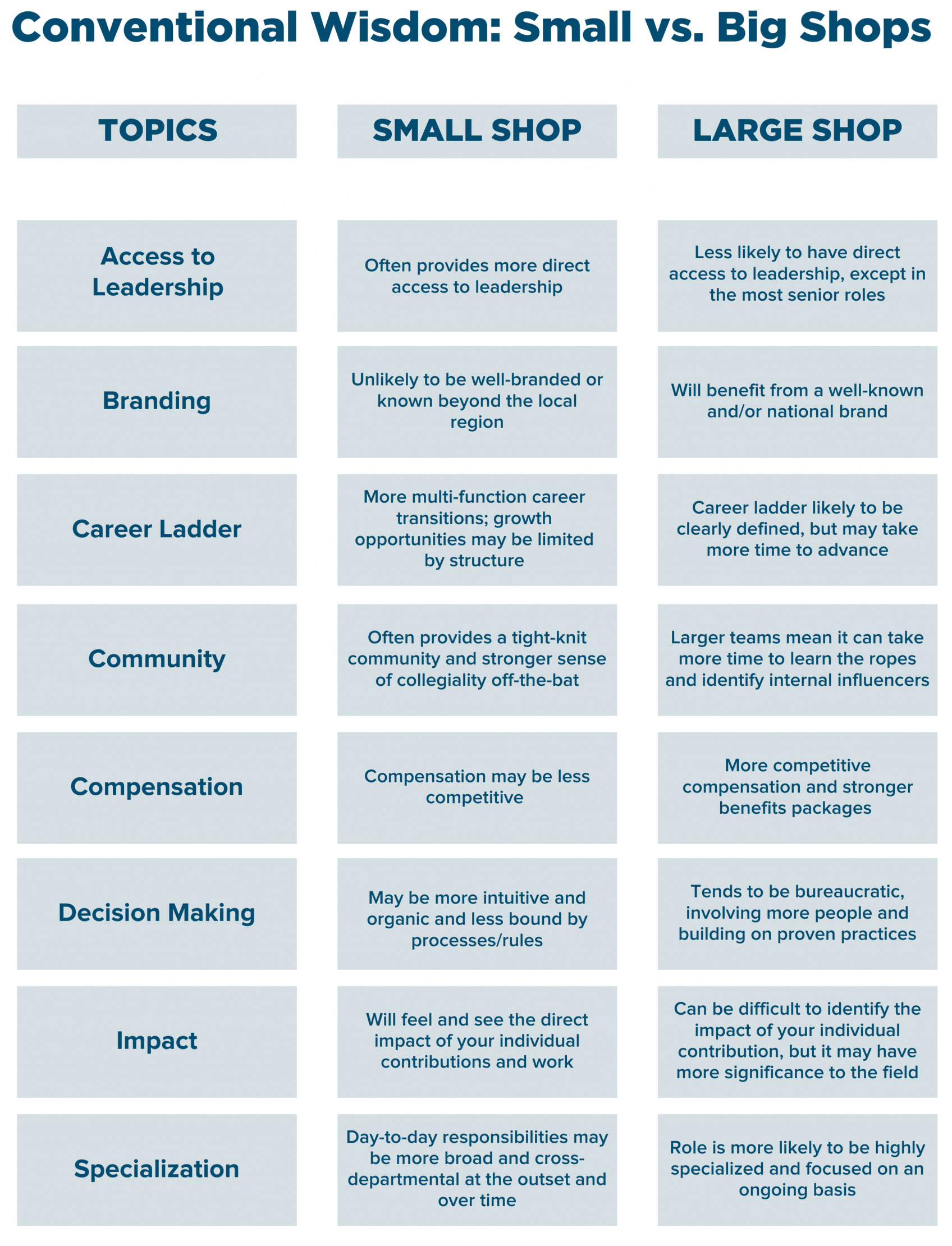As an executive search consultant, I have often noticed a reluctance from my nonprofit clients to consider (let alone, actively recruit) candidates from shops of a different size than their own. They worry that these candidates may take longer to on-board and will lack an innate understanding of their nonprofit organization’s structure, values, and processes. However, considering candidates from all shop sizes has myriad benefits: it expands the pool (which always increases the chances of an excellent hire), makes room for talented professionals who will bring transferrable skills as well as new perspectives, and provides an opportunity to add to and diversify your existing culture.
But before we dive into how to recruit candidates from different sized shops, let’s identify the conventional wisdom regarding the characteristics of small vs. big shops (with the caveat that what we consider small or big is relative and subjective). Keeping this information in mind will help you anticipate the questions and concerns that candidates may have when making the transition from one shop size to the other. Remember, when it comes to recruiting, a candidate’s perception is their reality! (And candidates, if you’re reading this, these guidelines can also help you to anticipate the pitch of a savvy recruiter.)

Now that we have discussed the conventional wisdom regarding small and big shops characteristics, as well as the reasons to recruit candidates from a shop size different from your own, let’s explore how to do so.
Consider employing one of these strategies:
Pitch the Whole Package
Home in on every characteristic your shop offers that the candidate’s current organization does not. For instance, if you are speaking with a candidate from a big shop about an opportunity to join your grassroots organization, underscore how they will benefit from more direct access to leadership, the opportunity to play an important role in decision-making, your organization’s tight-knit community, the chance to witness the direct impact of their work on constituents, and the opportunity to broaden their expertise by taking on diverse responsibilities. On the other hand, if you are speaking with a candidate coming from a small shop, emphasize the opportunity that a larger shop offers to excel in a clearly defined role and gain best practice experience at a well-branded organization, as well as the competitive compensation package you can provide.
Identify One or Two Hooks
Some candidates are curious about every aspect of the role and offer; others may have only one or two clearly defined deal makers and deal breakers. Pay close attention during your initial conversations to determine which is the case. If it becomes clear that a potential new hire cares most deeply about their ability to make an impact or maybe about the opportunity to be exposed to a sophisticated fundraising operation, then tailor your pitch to speak directly to those interests/concerns. It is also worth keeping in mind that while compensation is always of importance to candidates, it is rarely the sole reason they choose to accept an offer, so be sure not to rely on it as your sole hook.
Forget About Small vs. Big Entirely!
The candidate may be coming from a different sized shop, but in many cases, organization size may not be a main concern or motivation! Rather, they may be primarily focused on other aspects of the new role, such as your organization’s mission, the design of the role, the flexible work arrangement provided, or pre-existing relationships they have with current staff, etc. If the transition from a small to big shop (or vice versa) neither excites nor fazes the candidate, then your recruitment pitch does not need to focus on it either.
• • •
Questions or thoughts? I would be happy to hear from you. Please reach out to me at wweber@developmentguild.com.




